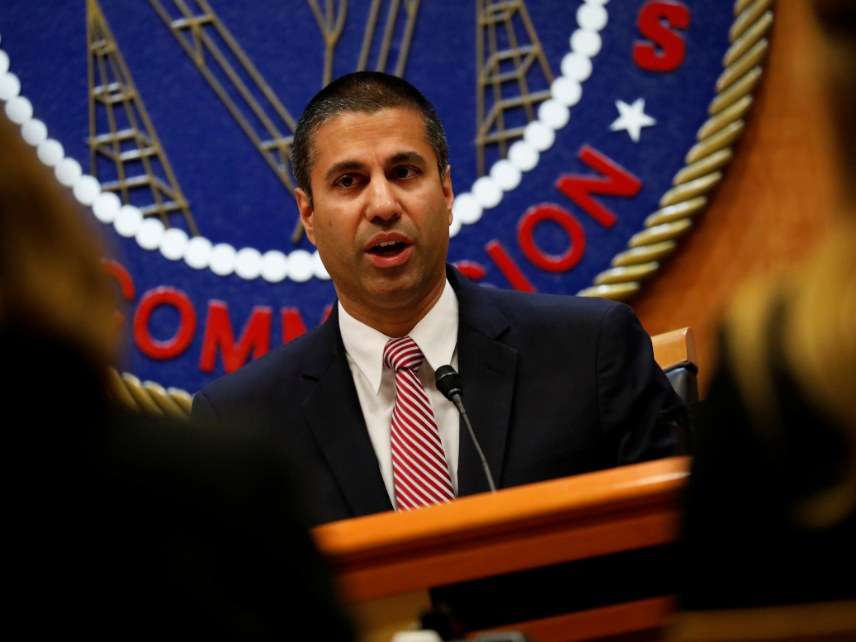FCC Chair Throws Water on Crazy Plan for Feds to Seize Control of Our 5G Networks
No, the government shouldn't nationalize our mobile infrastructure.

Somebody in the National Security Council wants to use some nebulous threat from China as an excuse for the feds to seize control of the nation's mobile network.
Reporters from Axios got their hands on the presentation and published the details Sunday evening. Axios summarizes:
The PowerPoint presentation says that the U.S. has to build superfast 5G wireless technology quickly because "China has achieved a dominant position in the manufacture and operation of network infrastructure," and "China is the dominant malicious actor in the Information Domain." To illustrate the current state of U.S. wireless networks, the PowerPoint uses a picture of a medieval walled city, compared to a future represented by a photo of lower Manhattan.
The best way to do this, the memo argues, is for the government to build a network itself. It would then rent access to carriers like AT&T, Verizon and T-Mobile. (A source familiar with the document's drafting told Axios this is an "old" draft and a newer version is neutral about whether the U.S. government should build and own it.)
First of all, the idea that the federal government is going to be able to build this faster than the private market is utterly absurd, as can be demonstrated by every single government project that has gone over budget and taken much longer than expected. As Axios notes, the wireless industry is already deploying 5G networks to customers. AT&T started rolling out 5G service with the start of the new year.
Experts told Axios that it will take a decade to roll out 5G networks altogether. This plan calls for it in three years, which seems wildly implausible. I suspect people in government think it's just like building highways: They just need to hire more people to make it happen.
And how exactly would nationalizing this infrastructure make it more secure? Has everybody forgotten the hackers (allegedly Chinese) who breached the federal Office of Personnel Management and got their mitts on millions of records of government employees? They succeeded partly because the federal government had done such a poor job at protecting data security in the first place. Why would any sensible American trust them to protect the security of a national network? What is the mechanism for accountability should they fail?
Fortunately, deregulation-minded Federal Communications Chair Ajit Pai recognizes how terrible this plan is. He put out a statement today:
I oppose any proposal for the federal government to build and operate a nationwide 5G network. The main lesson to draw from the wireless sector's development over the past three decades—including American leadership in 4G—is that the market, not government, is best positioned to drive innovation and investment. What government can and should do is to push spectrum into the commercial marketplace and set rules that encourage the private sector to develop and deploy next-generation infrastructure. Any federal effort to construct a nationalized 5G network would be a costly and counterproductive distraction from the policies we need to help the United States win the 5G future.
Nationalizing a massive chunk of a private industry is one of the crazier ideas to come out of the administration so far. Since this is a leak of a report, we have no idea how seriously the administration is taking it. They should back far away from this proposal.
